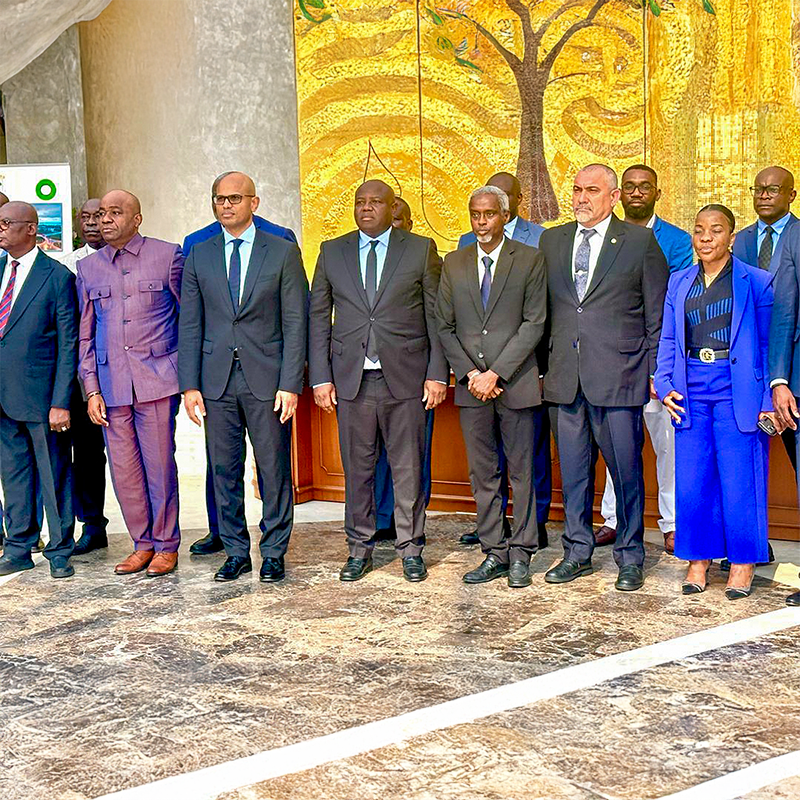
News
Equatorial Guinea Completes Nationwide Rollout of ASYCUDAWorld

Bata, June 2025 – Equatorial Guinea has successfully completed the nationwide rollout of the ASYCUDAWorld system, marking a key achievement in its customs digitalization efforts. The project reached a pivotal moment with the official launch of its second phase in September 2024, which focused on expanding implementation to all remaining customs offices in the country.
The national inauguration ceremony took place at the Government Palace in Bata, in the presence of the Prime Minister, the Minister of Finance, senior customs officials, and representatives from bilateral and multilateral partners. This event marked the culmination of an extensive multi-year initiative to modernize and automate customs procedures across land, sea, and air border points.
ASYCUDAWorld is now fully operational in all customs offices, enabling paperless clearance processes, selectivity controls, and post-clearance audit, all aligned with national legislation and international standards. The system was officially launched in 2020 following a Presidential Decree mandating its adoption.
In Bata, where the system became operational in November 2024, early results have demonstrated notable improvements in efficiency. Customs data from March and April 2025 show a 51.1% and 111.7% increase in revenue collection, respectively, compared to the same months in 2024.
In Malabo, the ASYCUDAWorld system had already been in place at the airport since 2020, and the recent extension to the port in March 2025 has further advanced digital processing capacity. In the first full month after deployment, March revenues rose by 17%, followed by a significant 89% increase in April, year-on-year.
More than 325 customs officers and economic operators have been trained nationwide, ensuring full system ownership and sustainability. With ASYCUDAWorld now fully operational nationwide, the country is well-positioned to strengthen compliance, improve service delivery, and accelerate customs and trade facilitation reforms. The system also enhances the collection of trade data, enabling faster release times, improved monitoring, and a stronger foundation for economic governance.
Watch the video of the national launch ceremony here:
Bata, June 2025 – Equatorial Guinea has successfully completed the nationwide rollout of the ASYCUDAWorld system, marking a key achievement in its customs digitalization efforts. The project reached a pivotal moment with the official launch of its second phase in September 2024, which focused on expanding implementation to all remaining customs offices in the country.
The national inauguration ceremony took place at the Government Palace in Bata, in the presence of the Prime Minister, the Minister of Finance, senior customs officials, and representatives from bilateral and multilateral partners. This event marked the culmination of an extensive multi-year initiative to modernize and automate customs procedures across land, sea, and air border points.
ASYCUDAWorld is now fully operational in all customs offices, enabling paperless clearance processes, selectivity controls, and post-clearance audit, all aligned with national legislation and international standards. The system was officially launched in 2020 following a Presidential Decree mandating its adoption.
In Bata, where the system became operational in November 2024, early results have demonstrated notable improvements in efficiency. Customs data from March and April 2025 show a 51.1% and 111.7% increase in revenue collection, respectively, compared to the same months in 2024.
In Malabo, the ASYCUDAWorld system had already been in place at the airport since 2020, and the recent extension to the port in March 2025 has further advanced digital processing capacity. In the first full month after deployment, March revenues rose by 17%, followed by a significant 89% increase in April, year-on-year.
More than 325 customs officers and economic operators have been trained nationwide, ensuring full system ownership and sustainability. With ASYCUDAWorld now fully operational nationwide, the country is well-positioned to strengthen compliance, improve service delivery, and accelerate customs and trade facilitation reforms. The system also enhances the collection of trade data, enabling faster release times, improved monitoring, and a stronger foundation for economic governance.
Watch the video of the national launch ceremony here:




